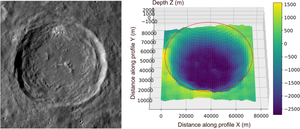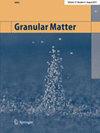Morphological study of granular–granular impact craters through time-of-flight cameras: from concept to automation in Python
Abstract
Laboratory made granular–granular impact craters have been used as model analogues of planetary impact craters. These kind of craters have been observed and studied using profilometry techniques that allow to retrieve important morphologic features from the impacted surface. In this work, we propose to use a Time-of-Flight camera (Microsoft Kinect One) for the acquisition of depth data. We show comparisons between the typically used technique and the analysis derived from the Time-of-Flight data. We also release craterslab, a Python library developed to automate most of the tasks from the process of studying impact craters produced by granular projectiles hitting on the surface of granular targets. The library is able to acquire, identify, and measure morphological features of impacted surfaces through the reconstruction of 3D topographic maps. Our results show that using a Time-of-Flight camera and automating the data processing with a software library for the systematic study of impact craters can produce very accurate results while reducing the time spent on different stages of the process.
Graphical abstract
Three-dimensional representation of the lunar crater Werner by craterslab as a tool for morphometric analysis of natural and laboratory impact craters.



 求助内容:
求助内容: 应助结果提醒方式:
应助结果提醒方式:


